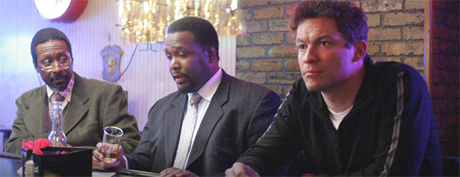“I regret the way that this matter has been used,’ Clinton told reporters. ‘The comments about it are baseless and divisive. I was personally offended at the approach taken that was not only misleading but unnecessarily hurtful.’” When asked about Congressman Jim Clyburn’s dissatisfaction with her recent remarks on the civil rights movement, Sen. Hillary Clinton suggests she‘s the aggrieved party here, and, worse, that a vast Obama conspiracy is to blame for people — including Clyburn — finding fault with her remarks. “She suggested reporters consider the sources of the criticism, much of which has come from the black community. ‘I think it clearly came from Senator Obama’s campaign and I don’t think it’s the kind of debate we should be having in our campaign,’ she said.” Wow. I mean, I’m running out of ways to be surprised here. Isn’t this the exact same cynical and misleading strategy that President Clinton just accused Senator Obama of running? This is just getting depressing.
Update: On Meet the Press, Sen. Hillary Clinton continues the “Vast Obama Conspiracy” defense. “‘This is, you know, a, a — an unfortunate story line that the Obama campaign has pushed very successfully,’ she said. ‘They’ve been putting out talking points. They’ve been making this — they’ve been telling people, in a very selective way, what the facts are.” Uh, swift-boat much? What evidence do you have that the Obama team is responsible for people finding your recent actions dismaying? And why not just say your words could be misconstrued, apologize, and move on? Instead, we get: “Clearly, we know from media reports that the Obama campaign is deliberately distorting this.” What media reports? (The closest I could find was this, when an Obama spokesman suggested there might be a “pattern” here. Well, given Billy Shaheen, mandatory minimums, “imaginary hip black friend,” and such readily misconstruable remarks as “fairy tale” and “kid,” and the LBJ “It takes a president” history lesson, I can see why one might think so. But I see little other evidence that the Obama campaign is responsible for the general dismay surrounding the Clintons right now. These people have no sense of shame.
Update 2: Obama’s response: “‘The notion that this is our doing is ludicrous.” Meanwhile, the Clinton people point to this memo, drawn up by Amaya Smith, Obama’s press secretary in SC but not released to the press. Sigh…this may well be the dumb mistake the Clintons have been baiting the Obama team to make. Still, having read through the memo, I’m not seeing any “deliberate distortions” of the Clintons’ behavior, so much as a litany of the unfortunate incidents that have been emanating from the Clinton camp. (I hadn’t heard the Trippi v. Penn “cocaine” one. Cute.) Plus, the memo seems to follow the concerned responses of leaders such as Jim Clyburn and Donna Brazile — in fact, that’s the newspeg. Hard to say that it created them.
Update 3: Hillary Clinton is defended by BET’s Robert Johnson, who also sees fit to bring up the drug spectre again. “‘As an African American, I’m frankly insulted that the Obama campaign would imply that we are so stupid that we would think Bill and Hillary Clinton, who have been deeply and emotionally involved in black issues when Barack Obama was doing something in the neighborhood that I won’t say what he was doing but he said it in his book’…Clinton’s campaign says Johnson was not referring to Obama’s past drug use. Meanwhile, Rep. Stephanie Tubbs Jones, another African-American supporter of Clinton, said of the comments, ‘Sometimes people say things that aren’t sanctioned…I can’t speak for Bob.’“
Update 4: Johnson — previously a stalwart foe of the estate tax, by the way — also went on to compare Obama to Sidney Poitier, and not in a good way. Yep, a classy day all around for Team Clinton. I have to think this’ll backfire.
Update 5: Johnson’s official response to his earlier comment: “Johnson said it would be ‘simply irresponsible and incorrect’ to read his words that way. ‘My comments today were referring to Barack Obama’s time spent as a community organizer, and nothing else.’” Now, read back into the original quote, that clearly doesn’t make a lick of sense. But who’s got his back? Why, Bill Clinton: “I think we have to take him at his word.” It’s not a lie if you believe it, right, Mr. President?

